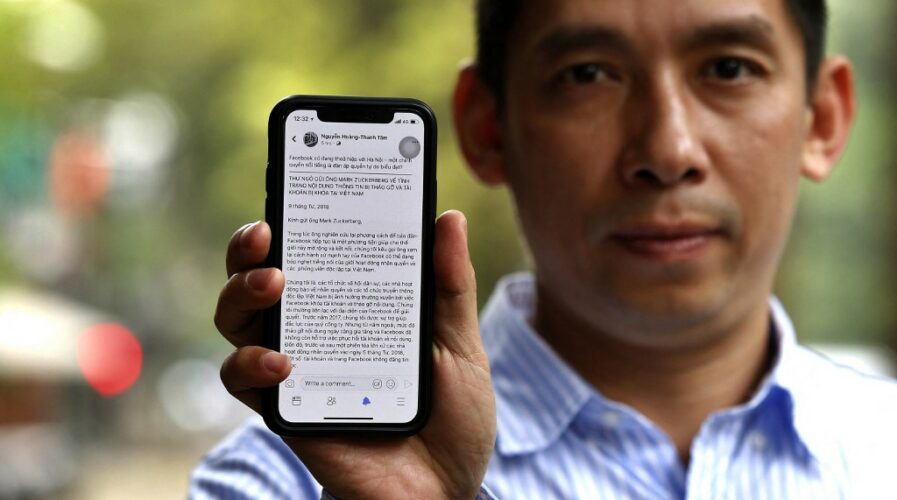
Facebook is the most popular internet platform in fast-growing Vietnam. (Photo by – / AFP)
What Facebook learned from rural Vietnam about chat-based e-commerce
As parts of its advertising business slow down, social media juggernaut Facebook is taking a page from rural communities in Vietnam, on how to engage with customers as well as online retailers using chat and video functions.
Facebook told Nikkei Asia that Vietnam, along with neighboring Thailand, are the surprise world leaders when it comes to the use of chat as a means to connect for online commerce, citing data measured by the volume of messages swapped between businesses and customers.
Chat-based digital commerce has been gaining ground in the Southeast Asian (SEA) region for the past several years, mirroring a trend of ‘social commerce’ that has become commonplace in more developed economies around SEA and elsewhere.
Unlike social commerce, where an e-seller livestreams broadcasts of their wares over popular social platforms like Instagram Live or dedicated platforms like Lazada’s LazLive to an audience of potentially thousands, emerging rural economies in SEA have become accustomed to corresponding with e-commerce sellers via chat services such as WhatsApp and WeChat.
Along with Thailand and Indonesia, Vietnam is one of the most important markets for Facebook. Nearly all of Facebook revenue is derived from online advertising, with Vietnam its biggest revenue driver in SEA. And although 62 million out of the country’s 98 million population reside in the countryside, according to the General Statistics Office, online spending is expected to grow more quickly among this segment than their urban neighbors – with spiking smartphone penetration and especially heavy use of video and chat capabilities.
Khoi Le, the head of Vietnam operations for Facebook, told Nikkei Asia that there used to be a misconception that rural users “don’t really use internet well”, but that Facebook’s own survey of 4,500 Vietnamese uncovered that an overwhelming 92% of rural households already use smartphones for playing games, online shopping, and to watch video. Last year, video streaming surpassed television as the predominant form of media in the country, with internet penetration topping television by 91% to 86%.
“It’s also very eye-opening for a lot of our colleagues in the U.S.,” said Le of the burgeoning digital trends in the country. “We actually build a lot of things to be scaled to the global audience. If you’re coming from the U.S. and you see things like this in Vietnam, it’s quite fascinating.”
Acutely aware of the evolving consumption habits of its biggest regional market, Facebook will prioritize a variety of video formats to engage users in Vietnam, including livestreaming, TV shows on Facebook Watch, video clips in news feeds, reposts from Facebook-owned Instagram, and disappearing ‘Stories’ short clips.
Facebook’s Le says these video options will live alongside the social giant’s chat functionality to complement e-commerce offerings, whether it be text comments to a live e-tailer during a Facebook livestream, or making inquiries over Facebook Messenger to either a live seller or AI-driven chat bots.
Facebook is still Vietnam’s most popular platform, but for the first time it is seeing serious competition from rivals. Bytedance-owned TikTok has been gaining a foothold in Vietnam, and with its own e-commerce offerings, would like to challenge Facebook dominance with its upstart short videos.
In the first quarter of 2021, Facebook surrendered three percentage points of market share, a first, while TikTok more than doubled its share.
READ MORE
- Strategies for Democratizing GenAI
- The criticality of endpoint management in cybersecurity and operations
- Ethical AI: The renewed importance of safeguarding data and customer privacy in Generative AI applications
- How Japan balances AI-driven opportunities with cybersecurity needs
- Deploying SASE: Benchmarking your approach


